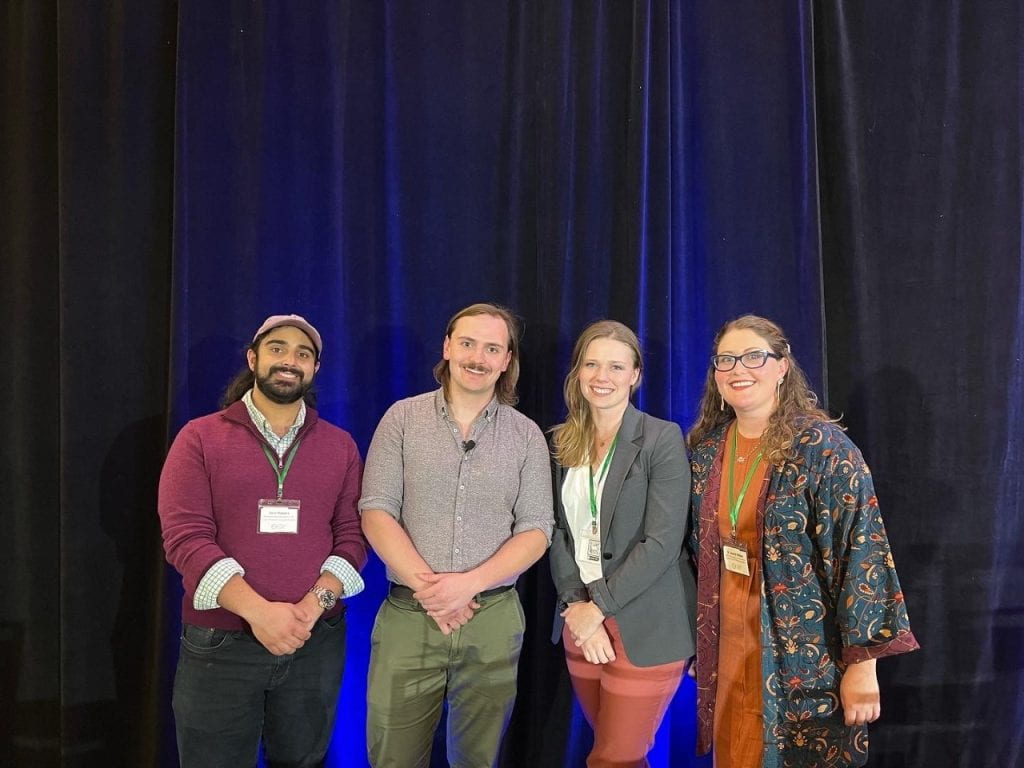
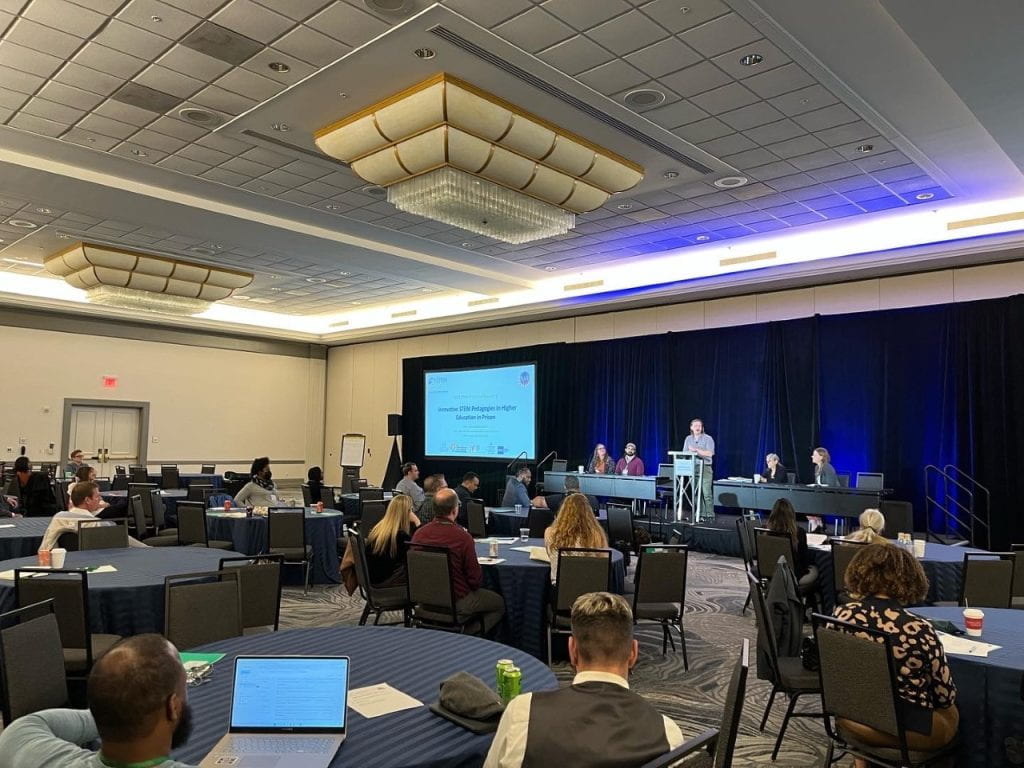
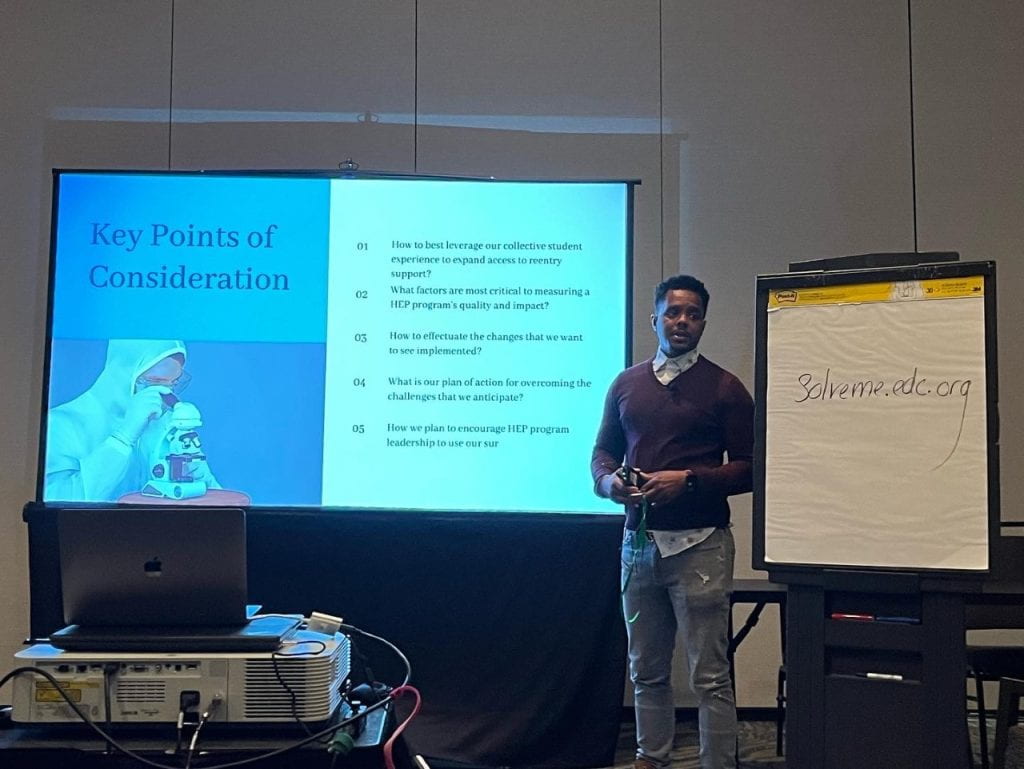
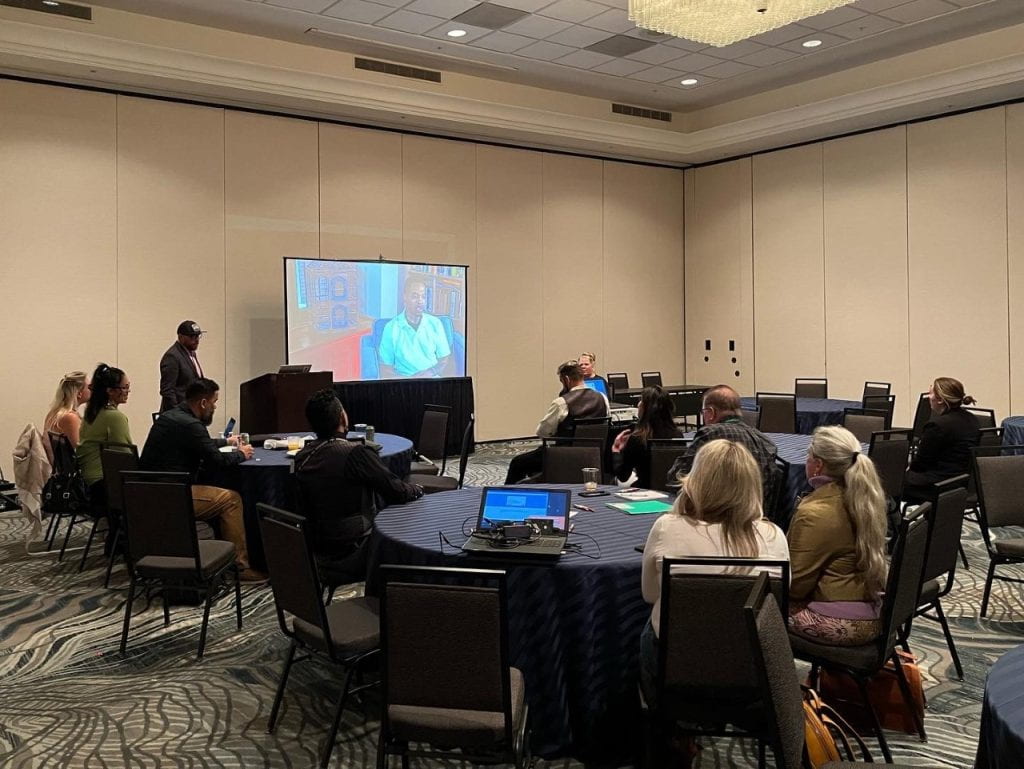
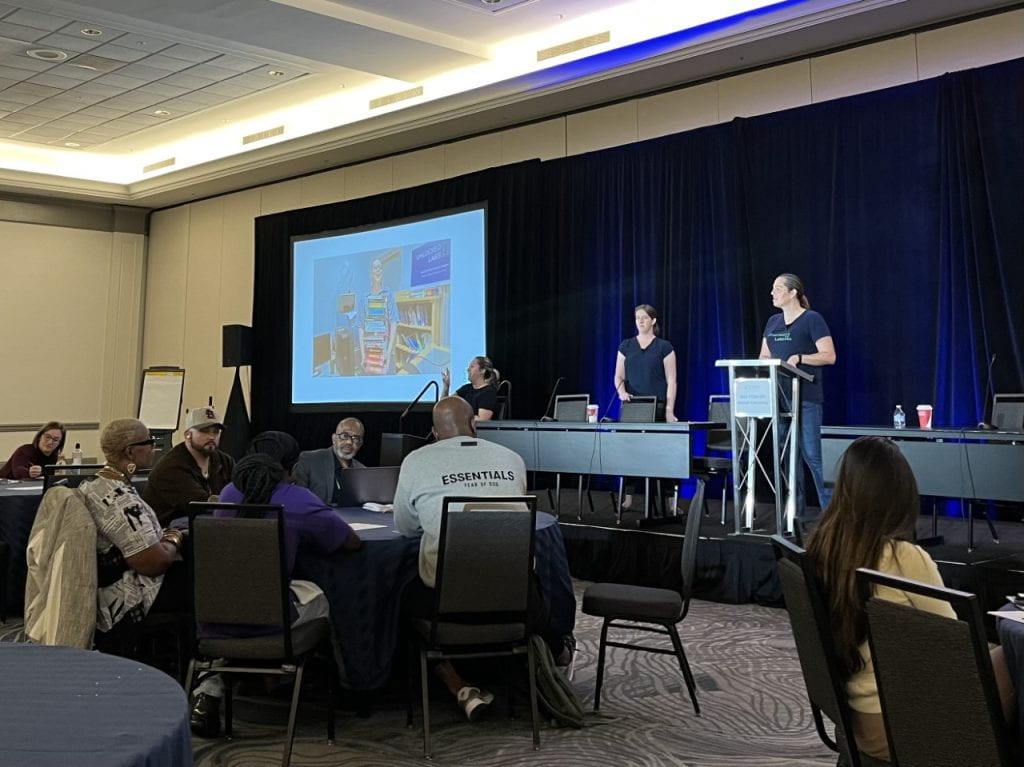
In late October, the Washington University in St. Louis Prison Education Project team attended the first STEM-OPS Annual Convening, a conference for stakeholders dedicated to expanding access to STEM education and careers for people impacted by incarceration. STEM-OPS, or STEM Opportunities in Prison Settings, is an alliance of partnered organizations guided by the vision that “all persons impacted by the carceral system are able, and encouraged, to pursue a culturally responsive and equitable high-quality STEM education and career.” The three-day event brought partners from across the country together in downtown St. Louis to learn from each other about the current state of STEM college-in-prison programming, expanding access to STEM opportunities for both currently and formerly incarcerated people, and the importance of learning pedagogies that meet the needs of system-impacted people and disrupt the school-to-prison pipeline. Over 60% of the individuals that presented at the conference were formerly incarcerated, including several alumni of the WashU Prison Education Project.
After the conference kicked off with welcoming remarks from Operation Restoration founder Syrita Steib, the core content of the event began with a panel on the logistics of working with prisons and Departments of Corrections to transform the carceral experience and reentry to support STEM pathways. Moderator Terrell Blount, who serves as both the Director of the Formerly Incarcerated College Graduates Network and Project Coordinator for the Education Development Center, spoke to the conflict inherent to working against the harms caused by the carceral system while needing to work within prisons and maintain relationships with corrections administrations.
“So when we talk about trust and transparency, if I’m being completely transparent with a corrections partner, I would probably say sir, I’m trying to teach the men and women or people in your facilities and equip them with the confidence, reassurance, tools, knowledge, and education so that they can put you out of business. I don’t want to see your prison existing. […] I don’t think I can be that transparent,” said Blount.
PEP Director Kevin Windhauser further explained the line that organizations working within prisons must walk in order to build trust with the incarcerated people they serve while also being able to effectively work within the institution incarcerating them.
“Especially if you are actively working in a program that teaches incarcerated students, you have the dual task of you need to build trust with the Department of Corrections that partners with you in this work, but you also need to ensure that you have an incredibly strong bond of trust between you and your students in the program. Our students see a side of correctional staff that they will never show me in a meeting, right? And so listening to students and figuring out who are the people to actually build bonds with is key. […] Ensuring that as we build one relationship of trust, we don’t sacrifice another is absolutely crucial to doing this work.”
Trust isn’t just created by who organizations build relationships with, but also how they build them. Particularly for college in prison programs, it’s crucial to set a high bar for what constitutes sufficient and successful programming.
“You signal to someone how much you value them by what opportunities you offer them and so for us doing any work involving education in prison spaces, it’s about pushing beyond limiting people to entry level things. […] And you might have to offer that entry level work, right, to bring people up to speed, but you should then be giving folks opportunities to go above and beyond, to reach levels just as high as they could on the outside. No matter how many times you tell someone we believe in you and your ability to do this and that, if you don’t offer them the opportunity to do that, you’re not sending a terribly strong signal,” explained Windhauser.
Effectively providing educational opportunities to incarcerated people goes beyond simply ensuring that they have sufficiently challenging classes and opportunities for career progression post-release. Creating constructive classrooms inside prisons requires a careful consideration of teaching pedagogy to counteract previous negative experiences students may have had with education, particularly in STEM fields. Several PEP instructors participated in an expert panel on the penultimate day of the conference on their own innovative classroom practices to encourage comfort and success in STEM. The panel was moderated by Kevin Windhauser, who began the discussion by introducing the stakes of students feeling included and welcomed into STEM classrooms.
“We know that for those for whom education has been traumatic, for whom it has done harm, for whom it has set on the infamous school-to-prison pipeline, that often begins with feeling alienated, pushed out, made less than in the classroom space,” said Windhauser. “We’re delighted to be able to bring together speakers who have done really incredible work in very different contexts or different disciplines to develop STEM classrooms in which students can have experiences in which they are delighted, excited, and prepared to succeed in the STEM classroom.”
While these issues apply to all educational programming inside prisons, they present particularly strongly in STEM classrooms, where imposter syndrome and math anxiety can easily be exacerbated.
“Our students, especially non-traditional students who have gaps in their education, tend to come to class with math anxiety. High math anxiety affects 17% of the population and the response to that is that it can be a traumatic response, right? So I design my math courses to support non-traditional students and combat math anxiety,” explained Dr. Lauren Miller, who is a regular professor with PEP and is currently teaching College Algebra at the Missouri Eastern Correctional Center (MECC).
While a strong understanding of educational gaps and the doubts many students have about their ability to succeed in STEM programs is critical, it is equally crucial to avoid reinforcing those doubts through treating incarcerated students as if they are any less capable than traditional college students.
“A lot of the conversations I’ve had these past few days have been about the importance of not teaching down, the importance of avoiding anything that resembles the soft bigotry of low expectations, and to treat students as completely and fully capable,” said Zain Clapacs, a current PEP instructor teaching Research and Experiment Design in STEM Fields at MECC this semester.
PEP’s time at STEM-OPS concluded with a keynote presentation from PEP Programmer and Unlocked Labs founder Jessica Hicklin and her co-founder, Haley Shoaf. Hicklin first worked with the Prison Education Project through Washington University’s Dev Shop at Potosi Correctional Center, where she served as the project’s lead coder. Since her release from Potosi in January of 2022, Hicklin has continued to work with PEP as a programmer building a Learning Management System (LMS) to provide incarcerated students with course management and content access tools that can support higher education programs like WashU’s.
“People who are close to the problem are usually close to the solutions,” explained Hicklin. Through Hicklin’s work and partnership with Unlocked Labs, PEP has debuted a connected classroom at the Women’s Eastern Reception, Diagnostic and Correctional Center (WERDCC) and plans to launch the system at MECC in time for the upcoming spring semester.
In addition to the PEP faculty and staff who led sessions and spoke at the convening, multiple PEP alumni were also in attendance to lead their own panels and roundtables on their work in STEM and reentry. Harvey Galler, a 2019 PEP graduate and founder of the STL Reentry Collective, shared his work using documentary filmmaking as an advocacy tool. Galler also presented with fellow PEP alum Jameel Spann on their working group’s development of an assessment tool to measure best practices for providing higher education in prison alums with reentry support.
While there were a wide variety of organizations and viewpoints represented at the STEM-OPS Annual Convening, they all shared one overarching goal: to expand access to educational opportunities for incarcerated and system-impacted people. PEP staff met and collaborated with so many organizations and individuals already doing incredible work towards this goal, but Director Kevin Windhauser spoke to just how far PEP and partnered organizations want to go to expand educational access.
“I’m really proud of the work that we’ve done […], but we currently operate to only a tiny fraction of the incarcerated folks in Missouri who are interested and able to do this work. And so thinking about how we as institutions of higher education can keep building these relationships and think about expansion in scale so that it’s not a matter of are you lucky enough to have access to one of these programs, but instead everyone has access to one of these programs.”
It was so great having you all at the STEM-OPS convening! What a great write-up of the event! Thanks.
-STEM-OPS program staff